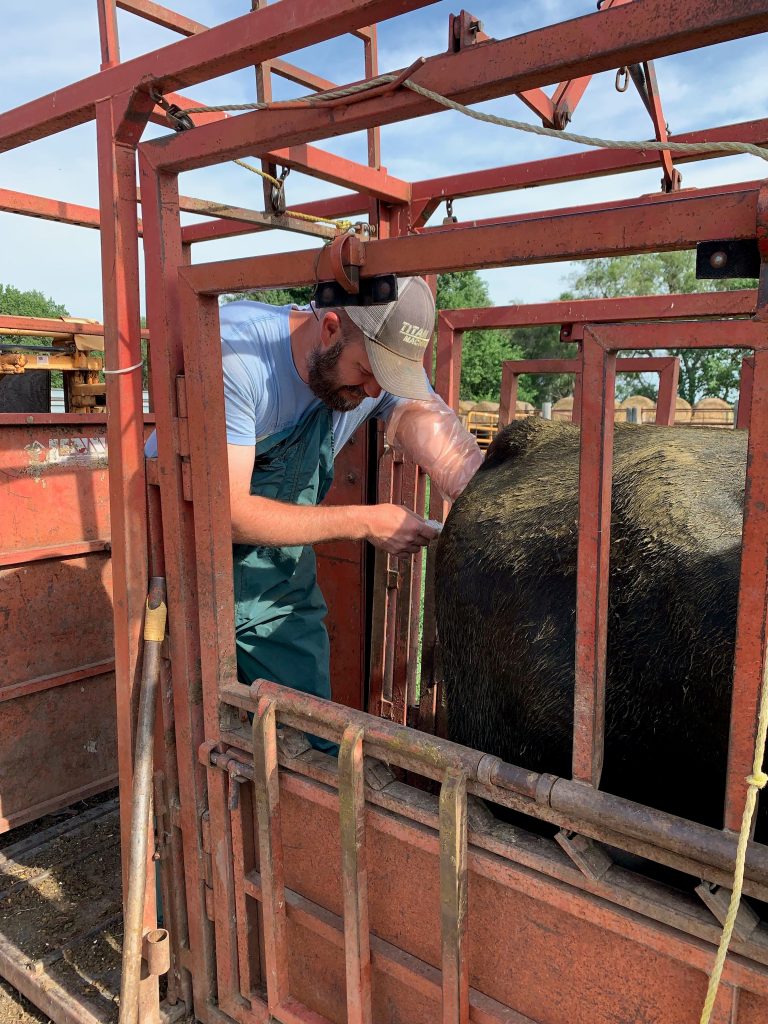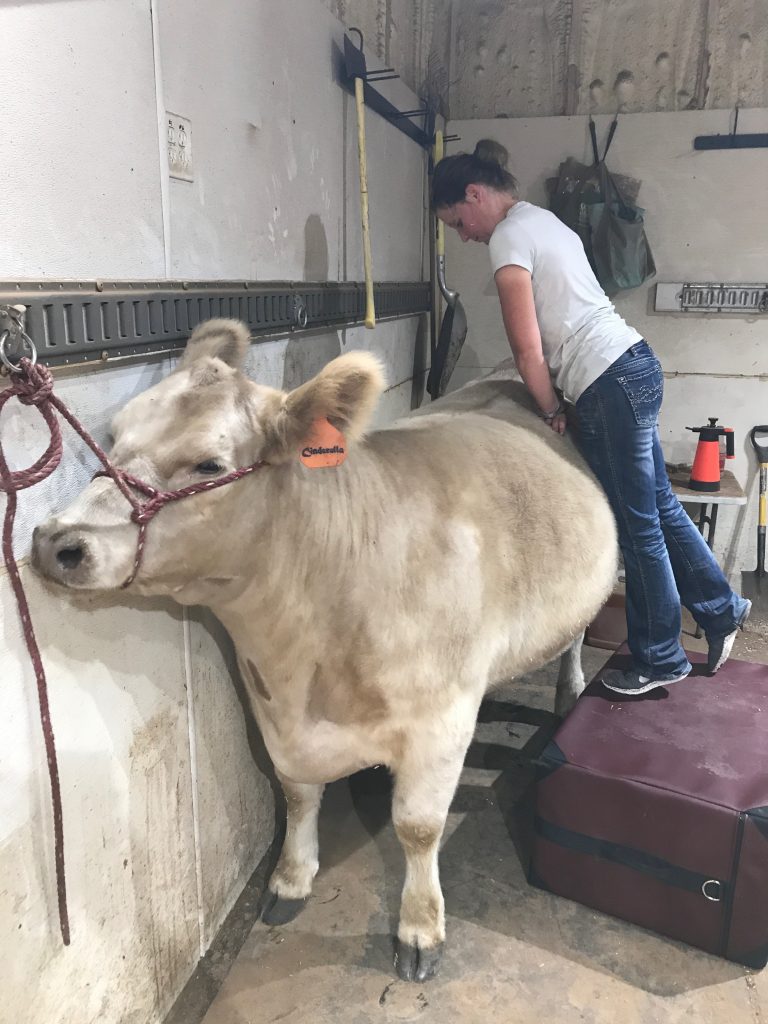Rural Veterinarians Play Integral Role in Livestock Producers’ Operations

By Lura Roti for SD Farmers Union
Lainie Kringen-Scholtz loved Frank. He was a 4-year-old rodeo horse in training she worked with herself. So, the day he broke his leg, she was desperate to get him the help he needed.
The first veterinarian she reached out to was not on call that night. The second veterinarian Kringen-Scholtz called was at the farm in less than an hour. Brooke Braskamp’s response impacted Kringen-Scholtz’s philosophy on how she would practice large animal medicine.
“She was eight months pregnant and trekked through 3-feet of snow to help me and my horse,” recalls the veterinarian, animal chiropractor and acupuncturist. “She was there right away. She didn’t care that it was zero degrees out. She didn’t care that she had the burden of being eight months pregnant, she was there to help me, and I just wanted to be able to do that for people too.”
Today, Braskamp is Kringen-Scholtz’s boss. And like her, Kringen-Scholtz is willing to be on call so that anytime of the day or night her clients need her, she is there for them and their animals.
Access to a veterinarian is crucial for South Dakota’s more than 14,000 livestock operations, explains registered Simmental producer Clay Duxbury.
“Our bottom line is already so tight, so that every live calf matters,” says the registered Simmental producer.
A few years back, a mysterious illness began plaguing Duxbury’s cattle – giving the calves’ fevers and scours.
“It was a virus actually, none of the antibiotics treated it,” Duxbury says.
After trying everything he could think of and losing a few calves, the Miller cattleman reached out to his veterinarian, Eric Knock.
Knock observed the cattle herd, collected samples and ran tests. Turns out, Duxbury’s soil was infected with a virus. Once Knock diagnosed the culprit, he was able to prescribe a treatment that worked for the calves as well as preventative measures like adding a feed supplement to his cows’ diet 90 days before calving.
“We’ve been doing that for six years now and it has completely changed the scope of our herd health,” Duxbury says.
Outcomes like this are among the reasons Knock became a veterinarian.
“Being able to hopefully make a difference. You know, take a situation, like the cow that wasn’t able to have a calf, and help change the outcome of that situation and make it better,” Knock says.

One of six veterinarians who make up Prairie View Veterinary Clinic, Knock and the team serve livestock and pet owners living near the rural communities of Redfield, Miller, Highmore and Wessington Springs.
Knock says he enjoys the diversity of his work.
“It’s not a 9-to-5 deal at all,” Knock says. “A lot of times we take a chute and go out to the producer’s operation, and we will process however many cattle we need to that are in that group whether that’s pregnancy testing, semen testing bulls, heifers, vaccinating or processing, whatever that involves. But then there’s also times we will be in the clinic working on small animals, surgeries, doing spays and neuters. You throw in the calving calls and those obviously aren’t planned, and so that adds a little bit of variety.”
Growing up on a crop and cattle farm near Willow Lake, S.D., Knock decided to become a veterinarian when it became obvious that his family’s farm was not large enough for him to return home to. Today, in addition to his work as a veterinarian, he and his wife, Roxanne, have a cattle herd of their own neighboring her family’s Tulare farm.
The Knock farm is also home to a menagerie of 4-H show animals and pets their children enjoy taking care of. With four young kids: Rylee, 12, RaeAnna, 10, Rielle, 6, and Roy, 4, the long days can sometimes be a challenge, but Knock says the work is rewarding.
“When I look back at the end of the day, there’s a lot of tangible, physical things our team was able to accomplish to help make situations better for our clients,” Knock says, explaining that even though he and the team of six veterinarians he works with treat animals, it is their owners they enjoy working with the most. “They are our neighbors. They are the people we go to church with and our kids go to the same
schools and are in 4-H together. My veterinary work is a way I can help the community as a whole and I find this rewarding.”
Duxbury says he not only depends on Knock when there’s a health emergency or routine procedures like vaccinations and pregnancy checks – but he also relies on Knock for advice on preventative measures to increase herd health and limit illness. “Improved nutrition and supportive care methods improves overall herd health and saves me a great deal of money.”
“We really try to be a partner in their livestock operation,” Knock explains. “So, we do quite a bit of consultation work with livestock producers. Talking about genetics and grazing management and all kinds of different things to help prevent issues from happening.”
There is a need for rural veterinarians like Knock and Kringen-Scholtz. According to the American Veterinary Medical Association (AVMA) website, “For many years, some rural communities have suffered from inadequate access to livestock and public health veterinarians.”
One reason for the shortage is income. According to a 2018 study, published by the AVMA, veterinarians whose practices focus primarily on livestock earn the least.
This disparity did not dissuade Kringen-Scholtz from pursuing her dream of becoming a rural vet. “At the end of the day, it’s really about the people. What I like about working the agriculture and livestock community is the people. They are good people. They are the people who will help you out of a snowbank when your truck is stuck. They are people who you can call if you ever need anything. They are fun to be around.”
In fact, her clients were the reason she took additional classes to become certified in animal chiropractic and acupuncture.
“I wanted to provide a service here in South Dakota that many would otherwise have to travel a long distance to receive,” she explains.
Most of her chiropractic clients are show animals, like those belonging to fourth-generation cattle producer Cody Williams.
“Show animals are like athletes. And if their muscles are a little sore or they are injured, they do not perform as well,” explains Williams, who raises registered Polled Herefords.
He shares a story of a time when a show heifer probably injured herself slipping on ice by the feedbunk. “We were really nervous that we were not going to get to show her the rest of the winter. So, we had Lainie come out. She was able to work on her and get things set back where they should be. We went from not being able to show her to being able to show her within the month.”
Another time, Williams had a bull that somehow injured himself bad enough, Williams thought he’d have to take him to the sale barn. After a chiropractic treatment, the bull healed well enough he was able to continue working.
It’s results like these that make rural veterinarians integral to a livestock operation’s success.
“They look out for us producers and want us to thrive,” Williams says. “Veterinarians probably don’t get the thanks they deserve for the long nights and long hours on call and the things they miss out on because they are out here on our farms and ranches. So, whenever I can, I thank my veterinarian because there are a lot of times when they get the grumpy client because things are not going right on the farm – otherwise we would not have called them – and we are stressed.”

